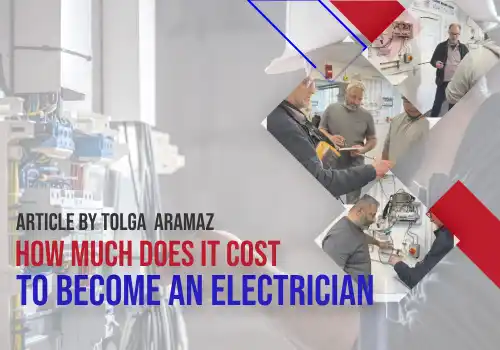

The electrical industry in the UK is a vital and growing sector, with a market size valued at £23.6 billion in 2023. This industry is expected to experience significant growth by 2030, driven by advancements in technology, renewable energy initiatives, and the UK’s commitment to achieving net-zero carbon emissions. Electricians are at the forefront of this transition, playing a crucial role in implementing energy-efficient systems and supporting the growing demand for electric vehicles, smart grids, and sustainable infrastructure.
For example, the UK government’s push toward net-zero carbon emissions by 2050 has created numerous opportunities for electricians. Case studies, such as the installation of energy-efficient lighting and heating systems in public buildings and the expansion of electric vehicle charging infrastructure, highlight the growing need for skilled electricians. These initiatives not only contribute to environmental goals but also provide job security and lucrative career prospects for electricians.
The average salary of an electrician in the UK is approximately £32,000 per year, with experienced professionals earning upwards of £40,000. As the demand for skilled electricians continues to rise, especially in sectors like renewable energy and smart home technologies, the earning potential is expected to increase, making it a highly attractive career choice.
Understanding the financial and time commitments required to become a qualified electrician is crucial. The cost of training varies depending on the pathway you choose, whether you’re starting from scratch, focusing on domestic installations, or fast-tracking your qualifications with prior experience. This guide will help you navigate your options effectively, ensuring you make informed decisions about your future in this growing industry.
| Pathway | Fully Qualified Route | Domestic Installer Route | Experienced Worker Route |
|---|---|---|---|
| Target Audience | Beginners or those with no formal qualifications | Electricians with 3 years of experience seeking formal qualification | Operatives with 5+ years of experience seeking formal certification |
| Objective | Become a fully qualified electrician | Certify domestic electrical installations | Streamline qualification based on existing skills and experience |
| Core Qualifications | - Level 2 & 3 Diplomas in Electrical Installations - NVQ Level 3 - AM2 Preparation - 18th Edition Wiring Regulations - 2391 Inspection & Testing - Part P Building Regulations | Level 2 Electrotechnical Diploma (2365) — Level 3 Part P – Building Regulations (Optional) — Level 3 18th Edition Wiring Regulations — Level 3 Initial & Periodic Inspection (2391) — NVQ Level 3 Electrotechnical in Dwellings (2347-03) | - 18th Edition Wiring Regulations - Level 2 2365 Diploma (online) - NVQ 2346 - Part P Building Regulations - 2391 Inspection & Testing |
| Study Options | - Full-time/Part-time (Standard) - Fast-track | Flexible (online study + in-centre assessments) | Flexible (online study + in-centre assessments) |
| Duration | Varies based on study pace (Standard or Fast-track options) | Flexible timeline depending on experience and availability | Flexible timeline depending on experience and availability |
| Outcome | Eligible for ECS Gold Card and Competent Person Scheme registration | Eligible for ECS Domestic Gold Card and and Competent Person Scheme registration | Eligible for ECS Gold Card and Competent Person Scheme registration |
| Career Opportunities | Work in various settings, including commercial and industrial environments | Focus on domestic-only installations | Full range of opportunities available to qualified electricians |
| Support Provided | Comprehensive support, including exam preparation | Guidance through certification requirements | Assessment and support through final qualification stages |
| Cost | £8,849 (Standard) or £7,299 (Fast-track) | £5,149 | £5,189 |
| Ideal for Those Who… | Want a complete qualification from scratch | Focus on domestic work and want to self-certify installations | Have substantial experience and want to formalize their qualifications |
Electricians are skilled professionals who handle various tasks depending on their training, credentials, and areas of specialization. Some common responsibilities include:
Electricians play a vital role in maintaining the safety, functionality, and efficiency of electrical systems in residential, commercial, and industrial environments.
Check out all the electrical courses you can enroll in.
Electricians can specialize in various fields based on their skills, training, and interests. Here are some common specializations:
Commercial electricians focus on the installation, maintenance, and repair of electrical systems in commercial buildings such as offices, retail spaces, and factories. They handle wiring, lighting, heating systems, and breaker panels. This specialization typically requires substantial experience in commercial settings. Commercial electricians can also explore specialist opportunities. As the demand for renewable energy solutions increases, electricians can specialize in areas like solar energy, electrical vehicle (EV) infrastructure, and energy storage systems. Courses such as the Renewable Energy Package and Electrical Energy Storage Systems are essential for those looking to focus on green technologies.
Residential electricians, also known as domestic electricians, primarily work in private homes, handling wiring, installations, and repairs. They may work independently as contractors or as part of a larger team. The Domestic Installer Course offered by Learn Trade Skills is an excellent way to enter this field, especially for those who prefer a faster and more focused training route. Also they explore renewable energy options, including Solar Panel Installation and EV Electrical Installation etc.
Maintenance electricians are responsible for ensuring that electrical systems within buildings or organizations operate smoothly. They conduct routine inspections and perform necessary repairs, such as fixing appliances or addressing wiring issues, to maintain safety and functionality.
For more details on the earning potential and career outlook, check out How Much Can an Electrician Earn in the UK in 2024?
Trustindex verifies that the original source of the review is Google. Having completed my C&G Level 2/3 with the team at LTS, I can confidently reccomend their services for those interested in signing up. The teachers Sezai and Paul offer a wealth of knowledge between themselves and were always happy to help answer any questions we could throw at them. The facilities and equipment provided are modern and plentiful. The class sizes being smaller was also a big bonus as the learning experience was a lot more detailed and thorough. Looking forward to completing my NVQ and taking a big step into a new career. Thank you to everyone at LTS for making this journey as pleasurable as possible!Trustindex verifies that the original source of the review is Google. Great learning environment and a fantastic teamTrustindex verifies that the original source of the review is Google. It will be helpful if your website allows me to opt out of all or some cookies. For now the only option is to allow "All Cookies" which I don't want to.Trustindex verifies that the original source of the review is Google. This is not a beginner friendly course. Go college instead and save your money.Trustindex verifies that the original source of the review is Google. My teacher David was helpful and reliableTrustindex verifies that the original source of the review is Google. If you have ever been scammed by a romance scammer or have been a victim of an investment fraud you should quickly search FASTRECOVERY through Email FASTRECOVERY97 @ GMAIL COM and request for a recovery of your funds on their page. They are very fast and efficient in the recovery of your lost funds. They are tested and trusted and very reliable.Trustindex verifies that the original source of the review is Google. Sam was very helpful in identifying which course was necessary for my electrical endeavour and was supportive throughout my journey. The teachers at the course have an extensive amount of knowledge which is express through their teaching and practical lessons. They are also very supportive and encouraging to help reach my potential. Would recommend to anyone whom would like to receive adequate education and training.
This route is for those who want to become fully qualified electricians and work in commercial, industrial, and domestic settings. It provides the essential skills and qualifications needed to work in various environments and meet industry standards.
To complete this route, you will need to achieve the following qualifications:
This route is designed for those who want to specialise in domestic electrical installations rather than working in industrial or commercial environments. It is a faster and more cost-effective route for those who only want to work on household electrical systems.
To complete this route, you will need to achieve the following qualifications:
This route is for electricians with at least 5 years of experience who want to gain formal qualifications. It allows experienced professionals to achieve full certification without starting from scratch.
To complete this route, you will need to achieve the following qualifications:
Recognized as a fully qualified electrician.
Eligible for ECS Gold Card.
Can register with a Competent Person Scheme.
The college route offers a traditional pathway that focuses on completing the full NVQ 5357, typically through an apprenticeship. This pathway is ideal for school leavers or those seeking a more structured, long-term educational experience.
The NVQ 5357 is the official apprenticeship route to achieving a Level 3 Electrotechnical qualification. While it is a comprehensive and well-recognized pathway, it comes with several limitations, especially for adult learners or those looking for more flexibility in their education and career progression.
1. Requirement for an Official Apprenticeship: The NVQ 5357 requires you to be employed in a formal apprenticeship role with an electrical business. This can be a significant barrier for adult learners or those who want to transition into the electrical industry but may not be able to commit to a traditional apprenticeship. This requirement restricts learners to government-approved apprenticeships, which can limit options compared to more flexible qualifications like the NVQ 2357.
2. Duration and Rigid Structure: The NVQ 5357 apprenticeship typically spans around 48 months, with learners spending the majority of their time in the workplace and attending college one day a week. This long duration can be challenging for those who need to upskill quickly or have financial responsibilities that make it difficult to stay on an apprenticeship wage for an extended period.
3. Apprenticeship Wages: Another major drawback is the lower wages associated with apprenticeships. For adults or those with prior work experience, the apprenticeship wage can be significantly less than what they could earn in a non-apprenticeship role. This makes the NVQ 5357 less appealing for those who need a higher income, particularly if they are supporting a family or have other financial commitments.
4. Limited Flexibility: Unlike the NVQ 2357, which allows learners to qualify through any electrical installation or maintenance role, the NVQ 5357 is strictly tied to an official apprenticeship program. This lack of flexibility can make it less suitable for those who wish to work in more varied or independent roles within the industry while they are training.
5. Less Suitable for Adult Learners: Overall, the NVQ 5357 is generally aimed at school leavers or younger individuals starting their careers. Adult learners might find the structure, duration, and financial implications less favorable compared to other training routes that allow for quicker qualification and better earning potential during the training period.
Beyond course fees, consider the following additional costs:
Learn Trade Skills and many colleges provide necessary resources during training, helping to minimize these additional expenses.
To make your education more affordable, various funding options are available:
These options help make the financial aspect of your training more manageable, allowing you to focus on your studies.
Choosing the right pathway to becoming a qualified electrician is crucial, as it directly impacts your time commitment and financial investment. Whether you’re starting from scratch, focusing on domestic installations, fast-tracking your qualifications with prior experience, or opting for a college route, you have various options to meet your needs.
For more detailed information, visit our guide on how to become an electrician.
Tolga Aramaz is the Director of Learn Trade Skills (LTS), a family-run training centre specialising in electrical installations. With years of experience and a deep understanding of the electrical industry, Tolga is known for their exceptional organisational skills, attention to detail, and commitment to delivering outstanding results. They provide valuable insights and guidance to electricians, contractors, and businesses, ensuring compliance with industry regulations and safety protocols. Through engaging training programmes and consultancy services, Tolga empowers professionals to excel in their roles, fostering long-term relationships built on professionalism and customer satisfaction.



© Copyright Learn Trade Skills 2025
“Lorem ipsum dolor sit amet, consectetur adipiscing elit. Ut pretium tristique purus nec consectetur. Nulla feugiat eget tellus aliquam scelerisque. Sed eget luctus enim, sed mattis enim. Lorem ipsum dolor sit amet, consectetur adipiscing elit. Ut pretium tristique purus nec consectetur. Nulla feugiat eget tellus aliquam scelerisque. Sed eget luctus enim, sed mattis enim.Nulla feugiat eget tellus aliquam scelerisque. Sed eget luctus enim, sed mattis enim. Lorem ipsum dolor sit amet, consectetur adipiscing elit. Ut pretium tristique purus nec consectetur. Nulla feugiat eget tellus aliquam scelerisque. Sed eget luctus enim, sed mattis enim.”
William Goss
Electrician course
11/11/2024